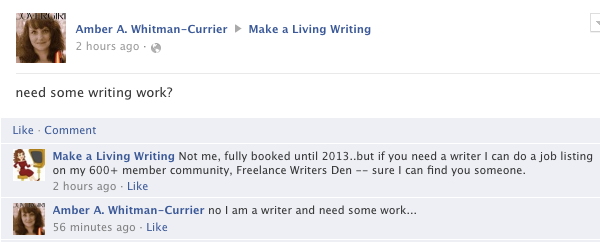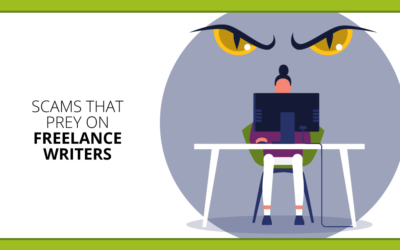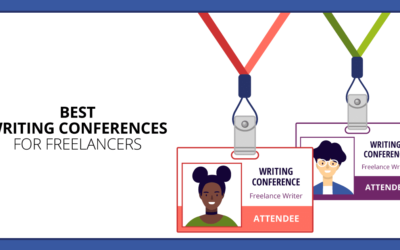
I know because I keep getting pitches from writers who are complete strangers to me, asking if I would subcontract them some of my freelance writing assignments.
At first, I thought it was a fluke. But it keeps on happening.
I asked around to some of the other successful freelance writers I know, and they told me it’s happening to them, too.
So today, I’m laying out three basic rules about contacting prospects on Facebook, Twitter, et al to ask for work.
I want writers to be able to do this without pissing people off, so here we go:
1. Never pitch as a first contact.
If you have never interacted with this person before and don’t know them, do not ask them for work, period. DO NOT set an autoresponder to ask them for work the minute they follow you on Twitter.
Back up a bit. First, retweet or share their stuff. Comment on their blog. Say “hiya” and chat about something you notice them talking about that interests you. Follow or connect with them. THEN, maybe, if it feels comfortable, you might talk business.
Don’t be like this guy who hit me on Facebook recently out of the blue:
Why some writers think another writer would hand over some of their good-paying writing work to a total stranger, I cannot guess. Sure, I’m going to put my reputation on the line for you, bud!
But for anyone who is still confused, let me assure you: It is going to happen when pigs fly over the moon. You are wasting your time.
2. Identify likely prospects.
This is where writers seem to be going way wrong.
Generally, other writers are not going to be your main source of gigs. You’re just being lazy here, asking other writers to hand over their clients instead of going out and finding real clients of your own.
The thing is, my clients hired me because they want my experience and they like my writing style. You are fantasizing if you think I could randomly plug in a few other writers who have less experience, turn that stuff in, and my clients would think it’s all good.
They would definitely notice, my reputation would be shot, and neither one of us would probably end up getting paid.
To sum up, this idea is a non-starter. Move on.
If you want referrals from writers, start networking and getting to know other writers — ideally, by meeting them in person.
3. Craft an intelligent pitch.
Just because it’s social media, it doesn’t mean you can skip crafting a smart (but short) letter of introduction that shows you have writing skills and some knowledge of the prospect’s topic or industry.
For starters, it’ll help if you compose complete, grammatical English sentences, unlike this reachout I got below. It was so poorly done that, as you’ll see, I thought maybe the poster was looking to hire me instead of vice versa:
It’s at the point where I’m seeing several of these a week, between Facebook, Twitter, and my email inbox. Just stop it, people.
I mean, take a look at those two examples above. Neither opening sentence actually makes sense. Or starts with a capital letter, even. They needed to get together and swap punctuation marks so their sentences would work.
I know we’re an increasingly casual culture, but not this casual, folks.
The big rule of social media
Social media is just like in-person networking or socializing with friends, only it takes place online.
So follow the big rule: Don’t do anything in social media that you wouldn’t do at an in-person networking event.
Would you walk up to a stranger at a networking meeting and say to their face, right off, “Hi, you don’t know me but would you give me some writing work?” I’m going to hope not.
First, socialize. Help people, too. Then, you’ll be ready to think about asking for gigs.
Have you used social media to get clients? Leave a comment and tell us how you did it.











